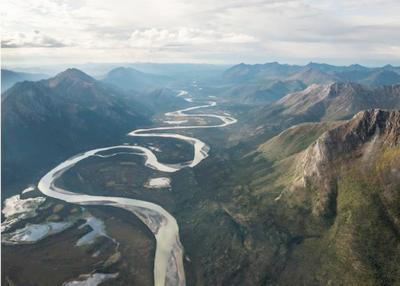
DENVER, Colorado, April 7, 2020 (ENS) – As America fought the new coronavirus over the past 30 days, President Donald Trump’s Interior Department rushed through dozens of attacks on the environment, finds a new analysis by the nonprofit Center for Western Priorities. In the month since Trump signed the first emergency coronavirus bill, the Interior Department has taken dozens of policy actions unrelated to COVID-19, removing protections for endangered wildlife, plus expanding mining operations and oil and gas leasing on public lands across the country.
The Center for Western Priorities’ analysis identified 57 separate actions taken by Interior Department agencies since March 6, when President Trump signed the first coronavirus emergency bill.

Those actions include 34 public comment periods that were opened or closed by the Interior Department despite numerous requests from local elected officials and members of Congress that Interior Secretary David Bernhardt suspend rulemakings during the coronavirus pandemic.
“While the country was focused on slowing a global pandemic, Secretary Bernhardt did not lose sight of his singular mission to deliver favors for the oil, gas, and mining companies that paid his salary for years,” commented Jennifer Rokala, executive director at the Center for Western Priorities.
“When you look at the audacious scope of what he was doing as the coronavirus crisis accelerated, it’s no wonder he was so blind to the risk that he created for America’s park rangers by refusing to close park gates,” Rokala said.
Since March 6, Interior has finalized at least nine actions that will have lasting effects on public and tribal lands, including expansions of hardrock mining operations in Arizona and Nevada, and the revocation of tribal trust lands from the Mashpee Wampanoag Tribe in Massachusetts.
The Mashpee Wampanoag have occupied the same region for over 12,000 years. The very tribe that welcomed the Pilgrims in the 1600s is at risk of losing what is left of their homelands due to a determination made by the Bureau of Indian Affairs, a part of the Interior Department.
The decision is a blow to tribal sovereignty and undermines the future and sustainability of the tribal nation. In response, the tribe is asking Congress to protect its reservation lands and has proposed the Mashpee Wampanoag Tribe Reservation Reaffirmation Act (H.R.312).
The Department of the Interior also continued its efforts to undermine the Endangered Species Act, advancing policies that would reduce protections for the humpback chub fish and a Puerto Rican orchid, and eliminating a proposal that would have established protections for the sage-grouse.
In March, the Interior Department held seven oil and gas lease sales, despite a glut of oil production leading to the collapse of global oil prices.
Interior also announced an April coal lease sale in Colorado despite falling coal production and mine closures due to the risk of COVID-19, the dearly respiratory disease caused by the novel coronavirus, as well as low demand for coal.

On March 27, the agency paved the way for a private mining road to be built through Gates of the Arctic National Preserve in Alaska.
Secretary Bernhardt’s former lobbying and law firm, Brownstein Hyatt Farber Schreck, has lobbied the Interior Department to approve the project on behalf of the Canadian mining corporation Trilogy Metals, based in Vancouver.
The proposed mine is expected to yield high-grade copper, zinc, lead, gold, and silver.
Jim Gowans, interim president and CEO of Trilogy Metals said, “I would like to congratulate the BLM for getting the Final EIS [Environmental Impact Statement] over the line. The completion of the Final EIS marks a critical milestone for the permitting process of the Ambler road which will unlock the incredible mineral potential of the Ambler Mining District. Trilogy, through its joint venture company, Ambler Metals LLC, is already discussing the next steps for the financing and development of the road with the Alaska Industrial Development Export Authority.”
The majority of Interior Department actions taken during the coronavirus pandemic have come from the Bureau of Land Management, BLM, an agency that has not had a Senate-confirmed director for the entirety of the Trump administration. On April 3, Interior Secretary David Bernhardt signed an order giving the acting head of the agency, William Perry Pendley, an additional 30 days in his present role.
In addition to the 32 public comment periods opened or closed since March 6, Secretary Bernhardt has refused to extend several key comment periods that opened just prior to the president’s signature on the first coronavirus bill. This includes the controversial plan to allow additional drilling near New Mexico’s Chaco Culture National Historic Park.

New Mexico’s congressional delegation and conservation groups have urged Bernhardt to extend the window for public comment, which opened on February 28th.
The Bureau of Land Management did extend one comment period on April 6, giving the public until May 21 to comment on six draft environmental impact statements that affect sage-grouse habitat across the West.
In addition to the 57 actions taken by the Interior Department, the White House Office of Management and Budget, OMB, also continued to hold meetings with oil and gas companies regarding future rulemakings by the Interior Department.
On March 18, OMB and Interior officials met with representatives of Shell, ExxonMobil, ConocoPhillips, and the American Petroleum Institute regarding a proposed rule on how oil, gas, and coal companies are allowed to value products extracted from public land when paying royalties to taxpayers.
The Trump administration in 2017 attempted to repeal an Obama-era rule that closed a loophole allowing companies to essentially sell coal to themselves at below-market prices, but that repeal was blocked by the courts.
Copyright Environment News Service (ENS) 2020. All rights reserved.
© 2020, Environment News Service. All rights reserved. Content may be quoted only with proper attribution and a direct link to the original article. Full reproduction is prohibited.



